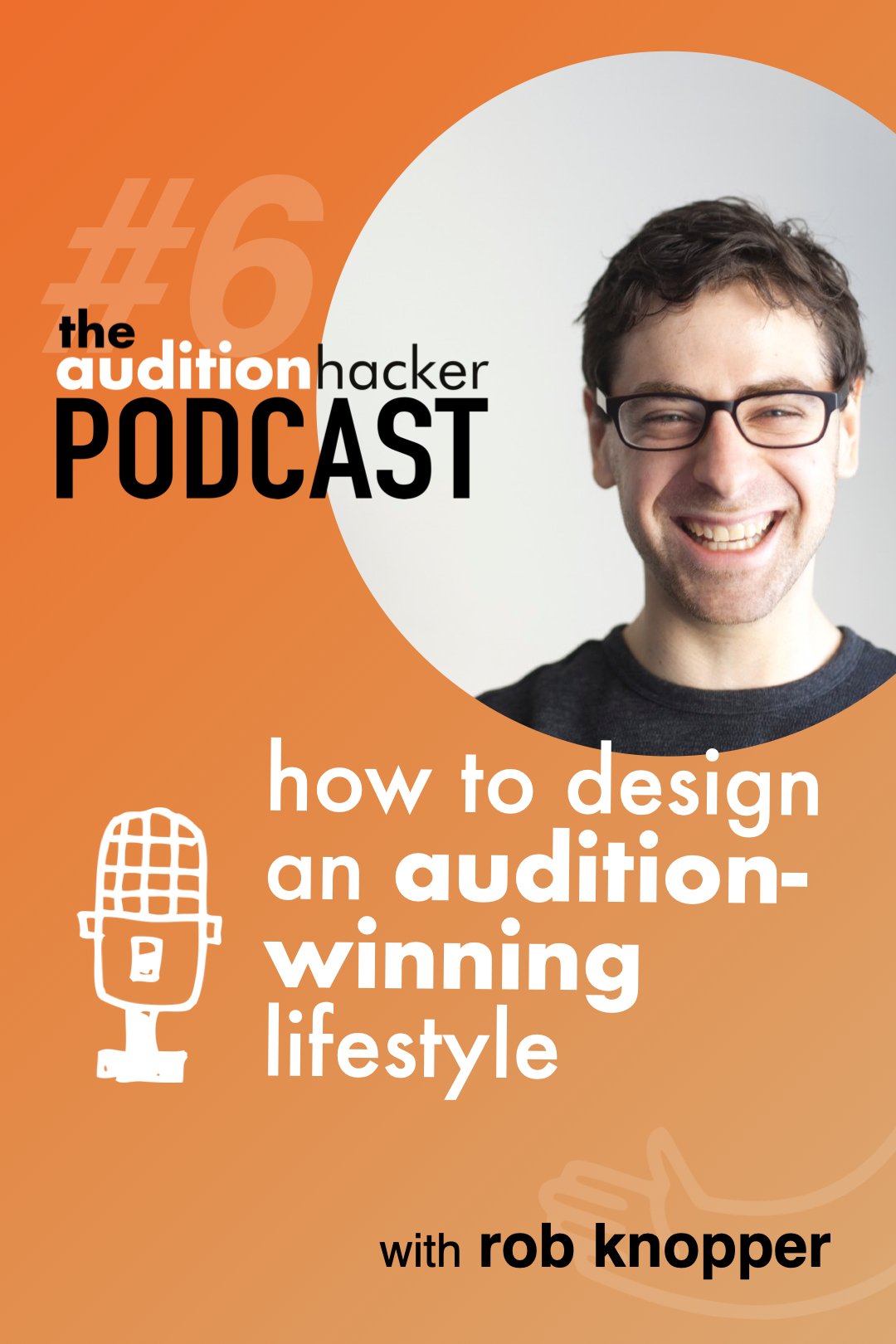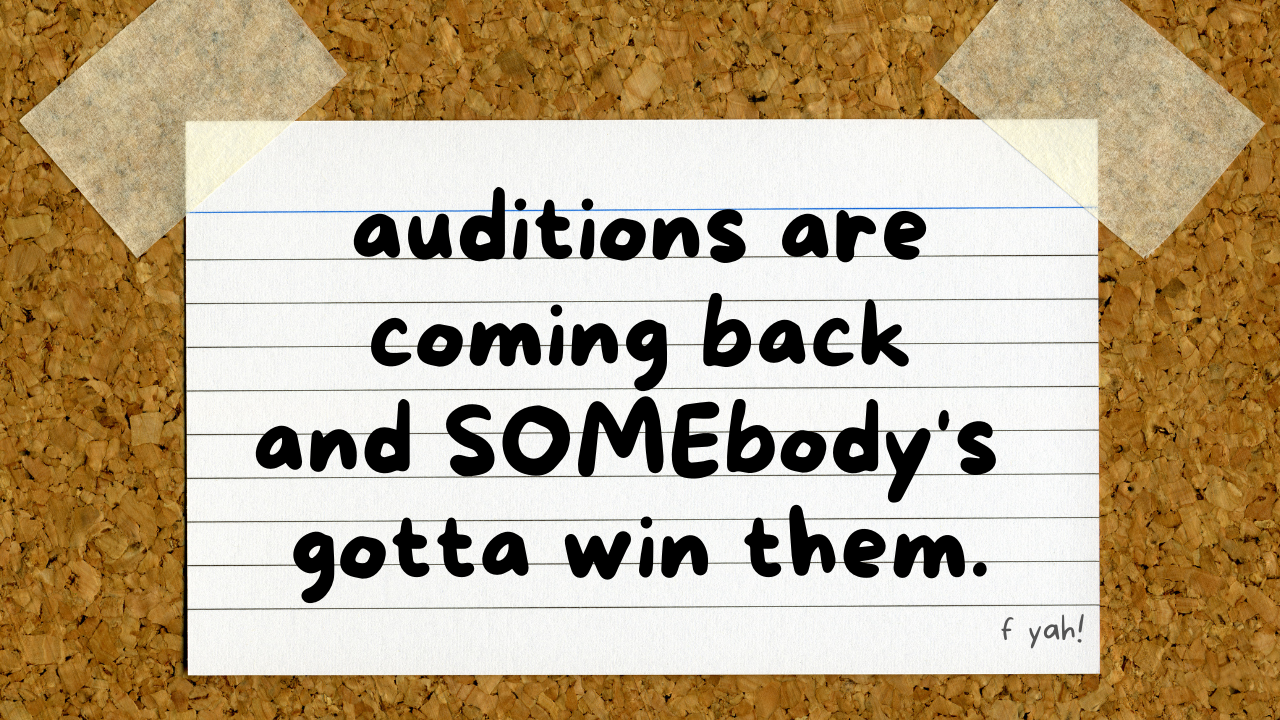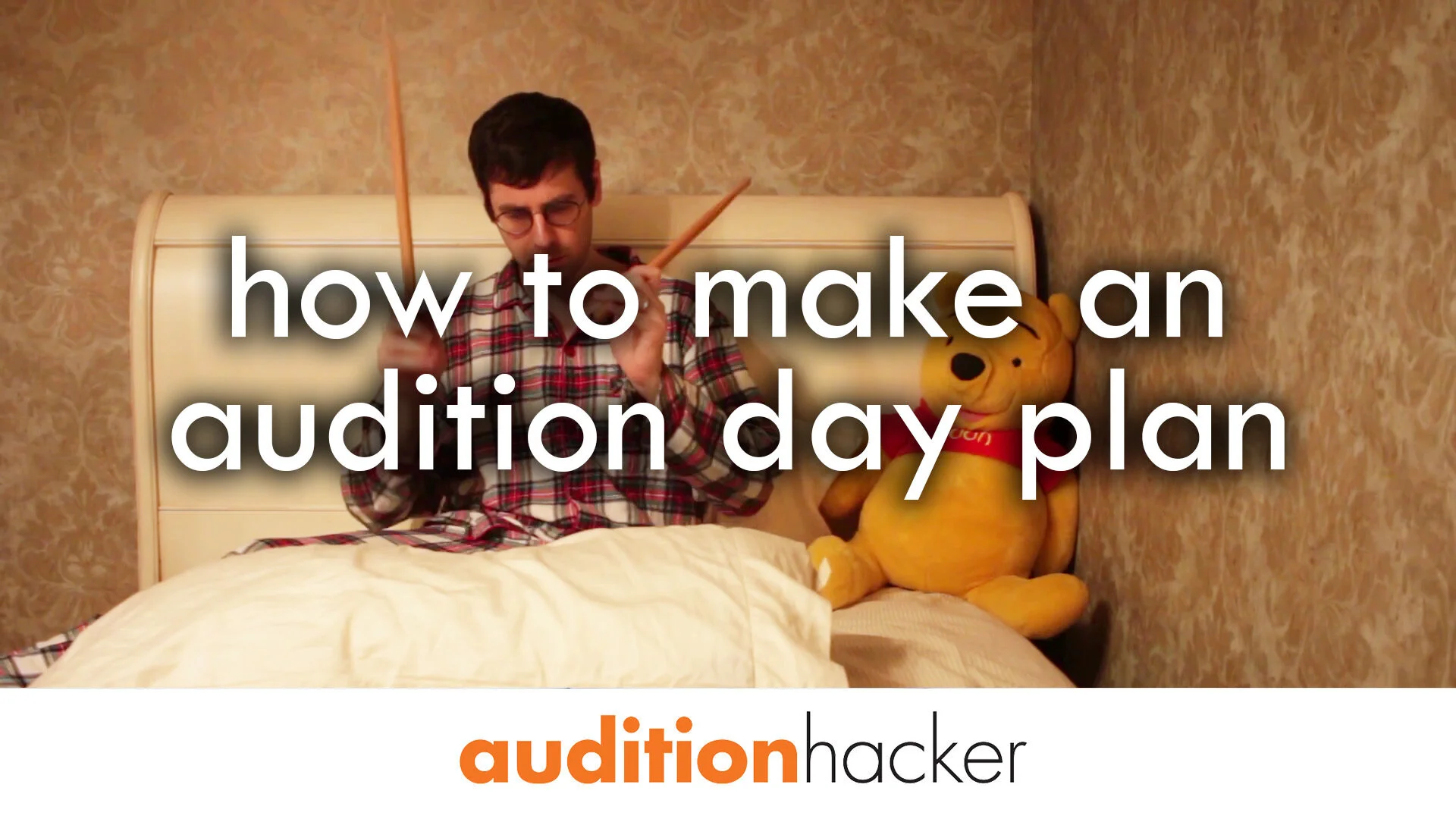photo by ripton scott
why’s everyone so tight-lipped about whether they’re taking an audition?
as a highly talkative and open individual, i’ve always blabbed about my projects. but i know plenty of people who won't even admit it when i ask directly.
in terms of whether to talk about an upcoming audition, it's not a no-brainer. as mark corrigan from my new favorite show, peep show, would say, "it's a brainer. a real brainer."
there are real benefits to divulging that information, and it can possibly change your life.
in the end it’s going to be a personal decision. are you a covert/cagey/reserved person? or do you see the value in sharing your ideas?
pro: you’ll get better at auditioning by sharing your ideas
if you talk about whether you’re taking an audition, it can actually help you get better at auditioning. that’s because once you dive into a conversation about auditions, you can start exposing your ideas on how to approach them, how to prepare, and what strategies you’re going to test out. for instance, here’s a conversation where you might learn something just by talking about it: “i’m flying to baltimore for an audition, but there are no good flights when i search on expedia.” “you should check out southwest. they aren’t listed on expedia, and you can check your bags for free.” BOOM. learned something new already, just by talking about it.
sharing your ideas improves your ideas, for (at least) 2 reasons.
1. DEVELOP ideas: when you have an idea in your brain, you can develop it... to a point. but when you actual force yourself to spit that idea out into the world, you’re also forced to translate that idea into complete sentences. by hearing yourself say it out loud, you can figure out what’s right or wrong about it, and you might even figure out a way to improve upon the idea.
2. hear NEW ideas (or perspectives): bouncing ideas off your friends, family, or colleagues can allow you to add a new perspective to your audition plan, which could offer an improved strategy for your audition process. you don’t have to take that idea, but it’s helpful to know one more thing that you could try. it’ll help strengthen your plan to know that you have a backup plan, for instance.
keep these positives in mind as you read over some of ways that throwing around an idea could backfire:
con #1: they’ll think you’re doing it wrong
we established above that sometimes your ideas (like how you’re planning on preparing for an audition) aren't fully formed yet. and so some of the people that you talk with will try to poke holes in the ideas and call into question the validity of them, instead of working with you to develop those ideas. those people are called ~*contrarians*~. and when you’re working with an undeveloped idea, you don’t have all the answers yet... because you’re just in the beginning stages of considering it at all. it could be more harmful to bring it up with those people than to just keep it inside.
action step: if you know who those people are, then you can either avoid either talking about it with them in the early stages, or position it as an undeveloped idea so they can’t knock it down. for instance, "i’m considering the pros and cons of doing a mock audition over skype for my friend in finland. what do you think?"
con #2: they’ll think you’re a quitter
not every plan that you make in life turns into reality. for instance, deciding to do 2 auditions next month might evolve into doing zero auditions next month, and one audition the following month. it could be for completely legitimate reasons. but presented in a particular way it may be interpreted as a decision based on laziness or illegitimate reasons.
if you tell someone you’re doing something that you’re not *absolutely sure* you’re going to do, and then you don’t do it, that person may or may not follow up by asking about it later. and if they do ask you how it’s going, and if you did cancel it, you might have to tell them you decided not to do it. and that might be embarrassing, even if you truly just ran out of time for it. and if you're insecure about my decision(, like i am about many decisions), you might have to face the fact that you "quit."
so if you know that you can’t handle it for somebody to follow up about something, for instance, then it might not be healthy for you to have told them the idea in the first place. and i know a lot of people who are like this - who won’t talk about an audition unless they have already won an audition.
action step: if you want all the benefits of talking about your auditions and plans, but you don’t want any of the negatives of having to face people if you decide not to take the audition, you have two viable options. first, when initially telling people your plans, you can position it as an unconfirmed plan, i.e. “i’m preparing like i’m going to take it, but i haven’t committed,” or, “right now i’m planning to take it.” and if you do cancel it, you can always say something like, “i made the decision not to take it because…"
con #3: they’ll think you’re a loser
there’s one subset of people that could need to be left in the dark…because they don’t understand orchestral auditions. your family may fall into this category.
like, for instance, if you tell them that you’re going to audition, and then you don’t win, they might wonder why you seem to be failing at something. you can tell them that losing an audition isn’t failing at all - losing an audition is a necessary step along the way to winning an audition. everyone loses auditions before they win auditions. that's nearly an absolute fact.
but for your family, they might not understand that because they don’t know the music world and the audition journey experience as intimately as you. so for that reason you might want to be more careful about what you say to them.
action step: educate them. i took TONS of auditions before i won my job. basically everyone has to take multiple auditions before they win one.
con #4: they’ll think you have no loyalty
here’s a tricky scenario: you’re already in an orchestra, and you’re taking an audition for another orchestra. should you tell your colleagues about an audition you’re taking? here’s why it’s tricky:
your colleagues might feel betrayed if you’re actively taking auditions so that you can leave the orchestra. it’s people’s instinct to have pride in what they do and where they come from. people who are a lifer at that job might never understand why you’d want to leave. and in this case, especially if you don’t have tenure, it’s probably not a good idea to be open about the fact that you’re taking auditions for other places. the time when you haven't yet earned tenure is when people are most judgmental about how you go about your daily business. and you might not make the right impression on your colleagues if they know that you’re actively taking auditions.
however, i personally look at it a different way. if somebody new in my orchestra were to tell me that they’re taking an audition, i’d be all for it. first of all, i love hearing about people’s projects. i always do projects, and i’m always active. my brain doesn’t stop, and i can’t help it. i love knowing that other people are driven and active individuals, too. second, i think the pursuit of your dreams and ambitions is a truly honorable one. whatever your reasons for wanting to continue your career journey are fine by me.
so what should you do?
if you look through all the pros and cons above, you’ll see that they fall into two categories: (1.) improving at a skill, and (2.) protecting your image. i’m not saying one of those is universally more important than the other (even though i care wayyyyyyyyyyy more about the first one), but i am saying that these are the two major considerations that you’ll have to balance. if you have the opportunity to hear an audition tip from someone, that might change your life. you might achieve bigger and better things than if you always just played it safe. but if you put it all out on the line, it might affect your emotional health or your professional reputation. and as a keen and motivated musician, you’ll have to actively navigate this terrain for yourself based on your particular considerations and who you’re talking to.
…and here’s what i do:
like i said before, i’m someone who can’t stop talking about what i’m doing. i’m always intensely obsessed with one thing at a time, and whatever that thing is, i have to talk about it with everybody. because for me, in my mind, i’m in the middle of a developmental journey on one subject. i’ll think about it a lot, research possibilities, ask everyone i know for advice, work on it, and generally obsess over it. i want to get all the input that i can, and i generally don’t mind risking my reputation (within reason). to me, the more information that i can get from outside sources, the more ideas that i have or that i’ll be able to find. and the more ideas that i can find, the better decision i can end up making about a subject.
so, for instance, whenever i’m telling someone about a small decision that i have to make, i’ll basically have to tell them my whole life story. that's just to give them a reference of why i ended up at this stage in the process, and all the subtle details that go into my decision. for me, even just hearing myself talk about it helps me put together ideas and solidify concepts in my head - for the reasons i explained above. the more ideas i hear from other people, and the more i can develop my own ideas, the closer i get to making a better decision.
what do you do? help other readers make a decision by offering your own opinions on the matter, below!
looking for an audition breakthrough?
here's my 5-step guide to constructing your preparation process and optimizing it for maximum results.

















in 2019, a cellist named maria reached out to me about her audition struggles. on paper, she was the “worst audition candidate ever” (her words). she had 2 small children, a full-time teaching job, and hadn’t taken an audition in 4 years.